Estimated reading time: 8 minutes
Sure, homesteading isn’t for the faint of heart, but it really isn’t for the unprepared. Every journey towards off-grid living is different, but the more high-quality resource material you have in your library, the easier your life will be.
In our digital age, it’s easy to rely on Google or YouTube for answers, but when you’re living off the grid, or even just dealing with a power outage, those resources may not be available. A well-stocked bookshelf becomes your offline survival guide, giving you access to hard-earned knowledge exactly when you need it.
Below is a list of my all-time favorite books for learning about self-sufficient living and using once you are living the homestead dream. If you had zero access to the outside world, I believe these books would give you all the knowledge and knowhow you would need to thrive.
To make this list easier to navigate, I’ve broken it into categories: foundational homesteading skills, food production, livestock care, energy and water systems, and health.
Want to save this post for later? Click Here to Pin It On Pinterest!
The Basics
The Encyclopedia of Country Living by Carla Emery
When it comes to the classics, this one has withstood the test of time with its solid, comprehensive approach to animal husbandry, homegrown food, foraging, preserving, and much, much more.
This book is like having a wise neighbor who knows everything about homesteading–it is a true treasure.
The FoxFire Series
What began as a highschool project in the late 1960s to interview Appalachian people on their way of life expanded into a fourteen book series covering everything from baking bread in a Dutch oven over coals to local lore.
While these are hardly how-to manuals, they are filled with deep knowledge and fascinating history. You can always cherry-pick to find the volumes that are most relevant to your interests, but I promise that these books will become indispensable resources.
Even if you never build a log cabin or tan your own hides, the personal stories and photographs make these books a fascinating snapshot of a way of life that’s quickly disappearing.
The Resilient Farm and Homestead: An Innovative Permaculture and Whole Systems Design Approach by Ben Falk
This book is a comprehensive guide for creating resilient homesteads and farms. Ben Falk provides practical strategies and insights from his own experience on a degraded farm. The book covers land regeneration, energy conservation, and sustainable living practices, making it an essential addition to any homesteader’s library.
The Self Sufficient Life and How to Live It by John Seymour
Unlike Carla Emery’s Encyclopedia, this book offers a little less detail but excellent writing and easy, enjoyable reading. Reading through this book feels like having a conversation with an incredibly capable grandpa who wants to encourage you to be self-sufficient without scaring you away with too much information at once.
John Seymour is considered the founding father of the self-sufficiency movement, and it shows. One of the best parts of this book is the emphasis on coming up with creative solutions using whatever you have on hand.
Growing/Preserving Food
How to Grow More Vegetables by John Jeavons
While the biointensive growing method isn’t for everyone (it’s a lot of work upfront), this book is an invaluable resource for someone who wants to be 100% self-sufficient.
Beyond the practical advice on plant spacing and bed preparation, the master charts in the back help you to understand how much of a crop you need to produce enough calories to live on. I cannot emphasize how useful this was in my own farming practice.
Gaia’s Garden by Toby Hemenway
If you’re like me, the hippyish title might put you off, but don’t judge this book by its cover! Even though Bill Mollison has written an encyclopedia-type book on permaculture, Hemenway does a far better job of explaining the techniques and making them approachable.
This will help you understand soil structure, water use, wildlife habitat, and how to create a food forest that sustains itself without needing constant work from you.
Four-Season Harvest by Eliot Coleman
If you live somewhere where it never freezes, then you can skip this one, but if you live in a climate where you experience actual winters, then this is a great book that will help you continue to harvest fresh food all year round, without spending a ton of money on a greenhouse.
This is not a how-to guide, although it is very informative the writing is also entertaining and anecdotal.
Seed to Seed by Suzanne Ashworth
Plenty of gardeners buy seed every year, but seed buying is expensive and not an option for true homesteaders living off the grid.
This book is a comprehensive guide to saving seeds from over 160 different fruits and vegetables. I’ve used it for almost 18 years now and still refer to it on a regular basis.
Putting Food By by Ruth Hertzberg
This is a masterpiece of a book on how to preserve food safely and effectively. In my personal opinion, the older editions are better than the newer ones, but all of them are good. Many people consider this book the bible of home preservation.
Whichever books you choose, remember that reading alone won’t make you proficient. Try one or two new techniques each season so you’re building real-world experience alongside your book knowledge.
Raising/Butchering Livestock
The Backyard Homestead Guide to Raising Farm Animals by Gail Damerow
This is the best book for someone starting out with livestock or bees. It lays out the basics, has excellent illustrations, and will get you started on the right track.
Read this book before you begin buying animals to figure out which animals you really want and how to set your land up for them.
Storey’s Guide To…
Once you have livestock, you will eventually need more comprehensive in-depth information about the specific animals you are raising. Storey’s guides are the gold standard and you cannot go wrong with them.
They have guides on raising chickens, raising rabbits, raising sheep, raising cattle, raising ducks, keeping bees, and much more.
You Can Farm: The Entrepreneurs’ Guide to Start & Succeed in a Farming Enterprise by Joel Salatin
Even though this is technically a business book about farming, the concepts laid out by Salatin can be used at any scale to make sure your operation is sustainable.
Plus, he’s fun to read and will definitely make you think about what you’re doing, philosophically.
Butchering Poultry, Rabbit, Lamb, Goat, and Pork: The Comprehensive Guide to Humane Slaughtering and Butchering by Adam Danforth
If you plan on butchering your livestock, you need this book. The photographs and instructions are exceptional, and the step-by-step guides take all the guesswork out of butchery.
I used my first copy so much that I had to buy a new one, and I can’t recommend it enough.
Water and Energy
DIY Solar Power: How To Power Everything From The Sun by Micah Toll
This book is ideal for homesteaders who are interested in harnessing solar energy. Micah Toll explains the basics of solar energy and provides step-by-step guides on building various solar energy projects. It’s a great resource for those looking to reduce their energy bills and environmental impact.
The Homeowner’s Energy Handbook: Your Guide to Getting Off the Grid by Paul Scheckel
This is an easy-to-read book that can help homeowners transition to less grid reliance or get you started off-grid.
Scheckel is clearly a pro and breaks things down into digestible bits of information that empower you to build your own systems.
Rainwater Harvesting for Drylands and Beyond, Volume 1: Guiding Principles to Welcome Rain into Your Life and Landscape by Brad Lancaster
In this essential read, Brad Lancaster teaches homeowners how to collect and utilize rainwater efficiently, making it perfect for any homesteader looking to enhance their water self-sufficiency. The book is filled with affordable and simple strategies for storing and conserving water, tailored to any climate.
Water Storage: Tanks, Cisterns, Aquifers, and Ponds for Domestic Supply, Fire and Emergency Use by Art Ludwig
This book will help you learn everything you need to know about water capture, supply, and use.
It is an incredible resource on its own, but I have to add that Ludwig’s other book focused on graywater is a good companion to this one. Between the two, you’ll never waste another drop of rainwater or laundry-water.
Health and First Aid
The Herbal Medicine-Maker's Handbook: A Home Manual by James Green
James Green offers a thorough and entertaining guide to creating a variety of herbal remedies. From tinctures to creams, this book provides everything a homesteader needs to know about harvesting, preparing, and utilizing herbs for health benefits, making it a perfect fit for any natural medicine library.
Living Ready Pocket Manual – First Aid: Fundamentals for Survival by James Hubbard
Dr. James Hubbard teaches readers how to handle common injuries and illnesses when professional medical care is an hour or more away. This book is compact and practical, filled with easy-to-understand instructions and essential tips for anyone looking to improve their emergency preparedness skills.
The Survival Medicine Handbook: A Guide for When Help is Not on the Way by Joseph Alton and Amy Alton
This book by a doctor and nurse is an indispensable book for guiding you through what you should have in your medical kit as well as step-by-step instructions on how to treat unexpected health problems.
You’ll find information on over 100 medical issues, in addition to instructions on dealing with natural disasters.
You don’t have to buy all of these books at once. Start with the one or two that fit your current needs, then add to your library over time. Before long, you’ll have a trusted collection that you can turn to in any situation, whether you’re growing your first tomato or handling a full-scale off-grid emergency.
Like this post? Don't Forget to Pin It On Pinterest!
You May Also Like:



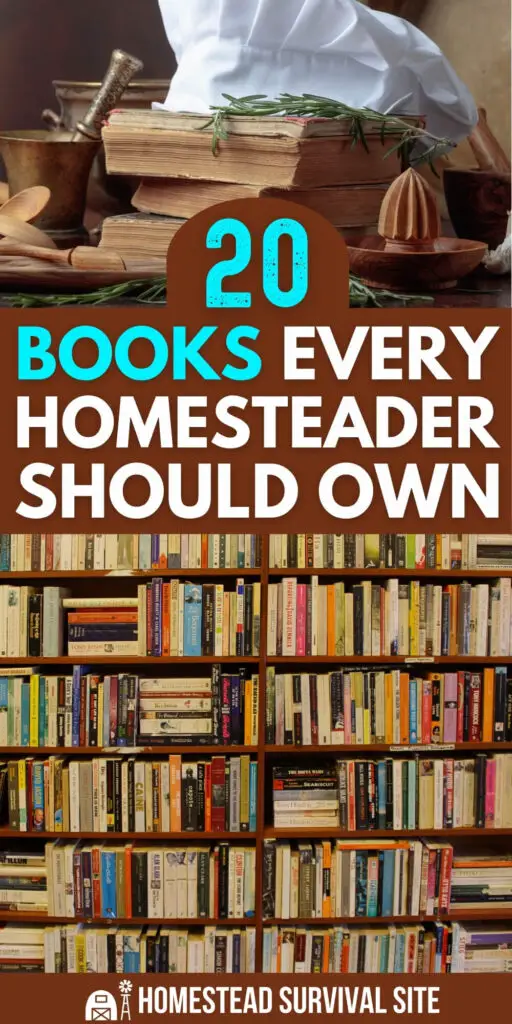

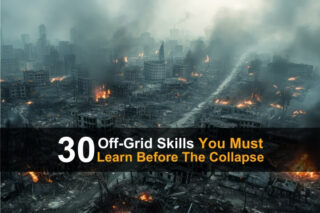
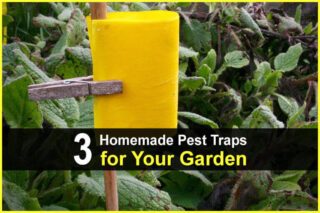
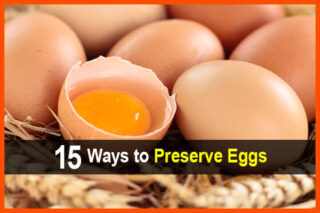
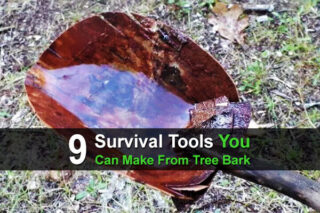
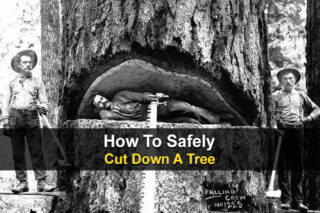
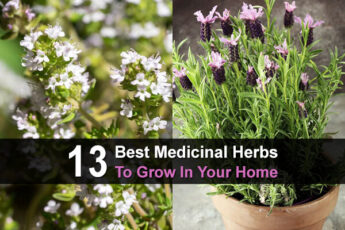
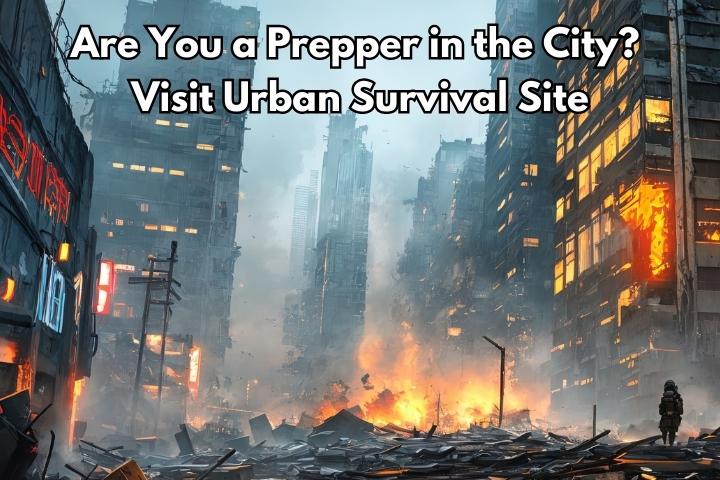

The Joy of Cooking is a must.